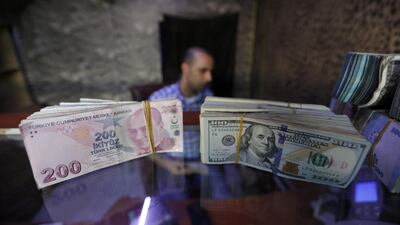Turkish lira traders have plenty of risks to navigate over the next few months but the prospect of a central bank misstep before municipal elections in March may no longer be one of them.
By leaving interest rates unchanged on Wednesday and keeping its rhetoric over the dismal inflation outlook hawkish, the central bank is helping dispel speculation it could usher in a new wave of currency depreciation with monetary easing before the vote on March 31.
The lira “seems to be free of the risk of a premature cut ahead of the local elections”, Inan Demir, an economist and Nomura in London, said in a note. Still, it may come under pressure again, “especially if geopolitical tensions re-emerge”.
The prospect of looser policy had weighed on the lira. Until Wednesday’s move to leave the benchmark at 24 per cent for a third consecutive meeting, it was off to the worst start among emerging markets this year. While the possibility of further tensions with the US over Syria continues to weigh on sentiment, the currency strengthened after the announcement to lead an advance among peers. The central bank’s next decision is on March 6.
The Turkish currency was trading 0.5 per cent weaker at 5.3675 per dollar as of 8:57am in Istanbul, according to Bloomberg. It gained more than 2 per cent against the greenback on Wednesday, trimming its losses for the year to below 1 per cent. Nomura sees the currency extending its appreciation 5.15 per dollar.
On Wednesday, the Monetary Policy Committee led by governor Murat Cetinkaya kept its language largely unchanged from last month’s statement, vowing to deliver “further monetary tightening” if necessary.
“While developments in import prices and domestic demand conditions have led to some improvement in the inflation outlook, risks to price stability continue to prevail,” it said. “Accordingly, the committee has decided to maintain the tight monetary policy stance until the inflation outlook displays a significant improvement.”
_________________
Read more:
Exclusive: Trade Bank of Iraq looking to acquire a Turkish lender
How Turkey's star crashed and burned
_________________
Turkey’s economy is sputtering because of the fallout from a currency crash over the summer. But inflation is still running at just above 20 per cent from a year earlier, four times the central bank’s target. Policymakers dragged their feet in 2018 and hesitated to raise rates aggressively, acting only after the currency buckled.
“The positive market reaction is the latest evidence that high interest rates are a major source of support for the lira,” said Rabobank strategist Piotr Matys. “While the sharp slowdown in inflation is a major positive signal, the lira’s volatile start to the year requires a cautious approach to monetary policy.”
Turkey's economy began contracting in the last quarter and won't grow again until the third quarter of 2019, while growth will miss government forecasts through 2021, a Reuters poll found, underscoring the serious damage caused by a currency crisis.
Turkey's economy will expand just 0.2 percent this year and by 3.0 percent next year, the poll of 51 economists showed - well below the government's sharply lowered respective forecasts of 2.3 and 3.5 percent.
"We expect that the slump in Turkey's economy will be deeper than most envisage. GDP growth will weaken sharply and is likely to hit a trough in Q1," Capital Economics said in a note, adding that the economy would slowly recover later this year.
The poll also showed Turkey's economy was expected to have shrunk by 2.7 percent in the fourth quarter of 2018, faster than a 1.4 percent contraction forecast in an October poll.

